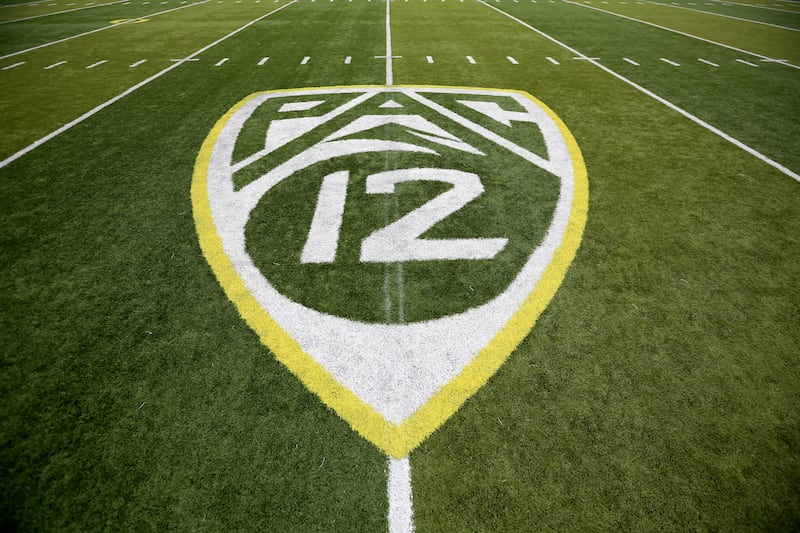Editor’s note: This story has been updated to reflect the cancellation of the Utah-UCLA game, which happened after the story was originally published.
One day before the second weekend of Pac-12 football play, the league is dealing with game cancellations yet again.
This time, though, two of the teams affected by cancellations will still get to play this weekend.
The Pac-12 first announced that the Arizona State-Cal game, scheduled for Saturday night for Tempe, Arizona, is canceled with the Sun Devils not having a minimum number of scholarship players available. Hours later, the Utah-UCLA game was also canceled, as the Utes program fell under the Pac-12’s threshold of having 53 scholarship student-athletes available to play under COVID-19 protocols.
Both games are being declared a no contest.
Instead, Cal will now play at UCLA this weekend, with the game being played at the Rose Bowl on Sunday at 10 a.m. MST.
These are the third and fourth games in the abbreviated Pac-12 season to be canceled due to the pandemic, joining the Utah-Arizona and Washington-Cal games from last weekend.
What is means for Arizona State and Cal
Arizona State is coming off a 28-27 loss to USC in the league’s first game of the season. The Sun Devils held a late 27-14 lead before the Trojans rallied with two touchdowns in the final three minutes to win. Arizona State is next scheduled to play Nov. 21 at Colorado.
Arizona State head coach Herm Edwards is among those who tested positive for COVID-19, the school said.
“As I’ve stated many times over, the health, safety and well-being of our student-athletes is absolutely paramount and we will not put them at risk,” Edwards said in a team statement. “Our team has worked extremely hard to get to this point, and even played a game last weekend. We will continue to care for our students-athletes and follow all protocols very thoroughly as we prepare for our next game. Our team and coaching staff are disappointed, but we do understand what we are dealing with.”
Cal, meanwhile, now gets to play its first game on Sunday, albeit against an opponent that wasn’t originally on its schedule.
During the league’s first week, a Golden Bears player tested positive for COVID-19, and combined with contract tracing quarantines in the city of Berkeley, California, it left Cal short of the required number of players at a position group — reportedly the defensive line — to play against Washington.
What it means for Utah and UCLA
Utah, with its first two games now canceled, must wait to play. The next scheduled Utes game is a Nov. 21 home matchup against USC.
“Our community is especially hard-hit right now by this virus, and our team and our department have been doing everything possible to follow protocols and avoid the spread of the virus,” Utah athletic director Mark Harlan said in a statement. “We were doing very well, day-by-day, and it is extremely difficult for our student-athletes and coaches that they will not be able to compete again this week.
UCLA, meanwhile, played during the league’s first week, losing 48-42. The Bruins now must prepare for their home opener against the Golden Bears on short notice.
With the Cal-UCLA game scheduled for Sunday, the Pac-12 moved the Bruins’ game next week at Oregon from Friday, Nov. 20 to Saturday, Nov. 21.
“The health and safety of Pac-12 student-athletes, coaches and staff remains our guiding principle. As we have said all along, this season is all about remaining flexible, and our team will stay ready to play,” UCLA athletic director Martin Jarmond said in a statement after the cancellation of the Utah game.
Pac-12 apologizes to Stanford
On Friday, the Pac-12 also released a statement apologizing to Stanford for a false positive COVID-19 test result that prevented three players, including starting quarterback Davis Mills, from playing in the team’s opener, according to ESPN. The Cardinal lost to Oregon, 35-14.
“During Pac-12 game day testing this past Saturday, there were testing protocol errors with respect to a Stanford student-athlete who tested positive for COVID-19,” the Pac-12 said in a statement. “The student-athlete and others who were immediately identified as individuals who would be high-risk contacts if the student-athlete were positive did not play in the game, in accordance with Pac-12 protocols, and the student-athletes were immediately isolated.”


